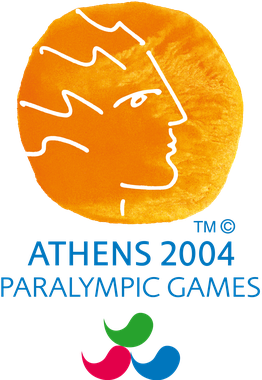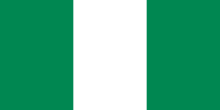
The 2004 Summer Paralympics, the 12th Summer Paralympic Games, were a major international multi-sport event for athletes with disabilities governed by the International Paralympic Committee, held in Athens, Greece from 17 to 28 September 2004. 3,806 athletes from 136 National Paralympic Committees competed. 519 medal events were held in 19 sports.

Great Britain competed at the 2008 Summer Paralympics in Beijing, People's Republic of China. Great Britain sent a delegation of around 400, of which 212 were athletes, to compete in eighteen sports at the Games. The team was made up of athletes from the whole United Kingdom; athletes from Northern Ireland, who may elect to hold Irish citizenship under the pre-1999 article 2 of the Irish constitution, are able to be selected to represent either Great Britain or Ireland at the Paralympics. Additionally some British overseas territories compete separately from Britain in Paralympic competition.

Tunisia participated in the 2004 Summer Paralympics in Athens. Tunisians athletes won a total of eight gold medals, seven silver and three bronze.
Swimming at the 1992 Summer Paralympics consisted of 163 events, 88 for men and 75 for women. Because of ties for third place in the women's 50 metre freestyle B3 and men's 50 metre freestyle B2 events, a total of 165 bronze medals were awarded.

South Africa sent a team to compete at the 1972 Summer Paralympics held in Heidelberg, West Germany, from August 2 to 11. They sent twenty five competitors, twelve male and thirteen female. The team won forty-one medals—sixteen gold, twelve silver and thirteen bronze—and finished fourth in the medal table.

Australia competed at the 2004 Summer Paralympics in Athens, Greece. It was Australia's 12th year of participation at the Paralympics. The team included 151 athletes. Australian competitors won 101 medals to finish fifth in the gold medal table and second on the total medal table. Australia competed in 12 sports and won medals in 8 sports. The Chef de Mission was Paul Bird. The Australian team was smaller than the Sydney Games due to a strict selection policy related to the athletes' potential to win a medal and the International Paralympic Committee's decision to remove events for athletes with an intellectual disability from the Games due to issues of cheating at the Sydney Games. This was due to a cheating scandal with the Spanish intellectually disabled basketball team in the 2000 Summer Paralympics where it was later discovered that only two players actually had intellectual disabilities. The IPC decision resulted in leading Australian athletes such as Siobhan Paton and Lisa Llorens not being able to defend their Paralympic titles. The 2000 summer paralympic games hosted in Sydney Australia proved to be a milestone for the Australian team as they finished first on the medal tally for the first time in history. In comparing Australia's 2000 Paralympic performance and their 2004 performance, it is suggested that having a home advantage might affect performance.

Kenya competed at the 2000 Summer Paralympics. They were represented by 13 sportspeople, 5 women and 8 men, at the Sydney, Australia hosted Games. Kenyan Paralympians won four medals at these games, one gold, one silver and two bronze.

Nigeria competed at the 2000 Summer Paralympics, sending a 31-member strong delegation that won 13 medals, 7 of which were gold.

Egypt competed at the 2004 Summer Paralympics in Athens, Greece. The team included 46 athletes, 36 men and 10 women. The Egyptian team included 46 sportspeople, 10 women and 36 men. This was 2 fewer women than the country had sent to Sydney for the 2000 Games. Three members of the delegation, including two athletes, participated in a study about dental health during the Games.

Kenya competed at the 2004 Summer Paralympics in Athens, Greece. Their delegation included 16 athletes, 8 men and 8 women, who won 3 golds, 1 silver and 3 bronze medals. Institutional problems inside Kenyan elite disability sport impact the country's performance at the Paralympic Games.
LC1 is a para-cycling classification. It includes a number of types of people with disabilities including people with amputation and spinal cord injuries that are mostly confined to the upper limbs. This class includes people from the ISOD A5 class, A6 class, A7 class and A8 class.
Para-swimming classification is a function-based classification system designed to allow for fair competition in disability swimming. The classes are prefixed with "S" for freestyle, butterfly and backstroke events, "SB" for breaststroke and "SM" for individual medley events. Swimmers with physical disabilities are divided into ten classes based on their degree of functional disability: S1, S2, S3, S4, S5, S6, S7, S8, S9 and S10. The lower number indicates a greater degree of impairment. Those with visual impairments are placed in three additional classes: S11, S12 and S13. One more class, S14, is reserved for swimmers with intellectual impairment. A final class, S15, is for athletes with hearing loss.

Kenya competed at the 1996 Summer Paralympics. The country sent a 17 strong athlete delegation to Atlanta, United States.

8 male athletes from Nigeria competed at the 1996 Summer Paralympics in Atlanta, United States.

Nigeria competed at the 2012 Summer Paralympics in London, United Kingdom from 29 August – 9 September 2012. Nigerian Paralympians combined won more medals than their Olympic counterparts in London, winning 6 golds, 5 silvers and 2 bronze medals.

In 1992, Spain had competitors in archery, wheelchair basketball, swimming, weightlifting, shooting, boccia, cycling, fencing, judo, tennis, 7-per-side football, table tennis and athletics.

Nigeria competed at the 2016 Summer Paralympics in Rio de Janeiro, Brazil, from 7 September to 18 September 2016. Nigeria's delegation of 23 sportspeople was mostly composed of powerlifters, with the country sending 14 lifters to Rio. Ahead of the Rio Games, the National Sports Commission promised Paralympic medals to erase the country's Olympic shame.

Egypt competed at the 2016 Summer Paralympics in Rio de Janeiro, Brazil, from 7 to 18 September 2016. The country sent a delegation of 44 sportspeople. The team included 16-year-old Ayattalah Ayman, the youngest member of the delegation and the first woman to represent Egypt in swimming. It also included 41-year-old Ibrahim Al Husseini Hamadtou, the only table tennis player to compete while holding the paddle in his mouth.

Nigeria competed at the 1992 Summer Paralympics in Barcelona, Spain, making their Paralympic debut. 6 competitors from Nigeria won 3 medals, all gold, and so finished 33rd the medal table. They competed in athletics, table tennis and powerlifting. Adeoye Ajibola was the country's big success story of these Games, going on to represent Nigeria in non-disability athletics and coming within a second of the men's non-disability 100m world record. Monday Emoghawve was the country's other gold medal winner in Barcelona, claiming gold in men's powerlifting.

The Faroe Islands sent a delegation to compete at the 2016 Summer Paralympics in Rio de Janeiro, Brazil, from 7–18 September 2016. They sent one participant, Krista Mørkøre, who participated in three events in swimming. Her top finish was 10th in women's 400 m freestyle S10, and she did not qualify for the finals of any of her three events.










